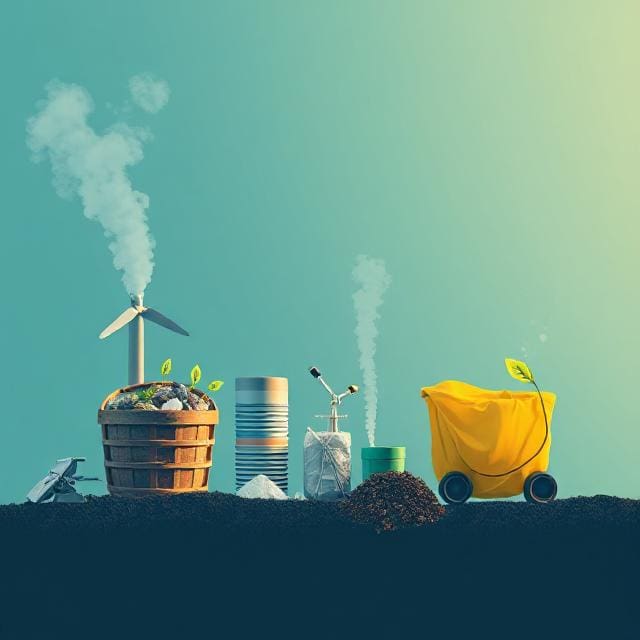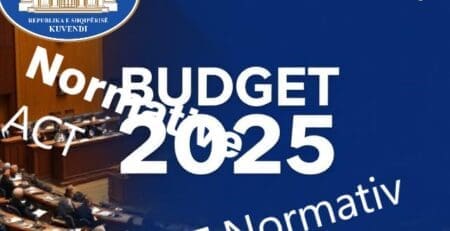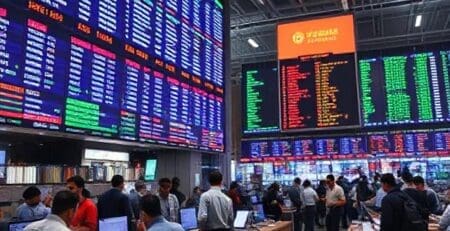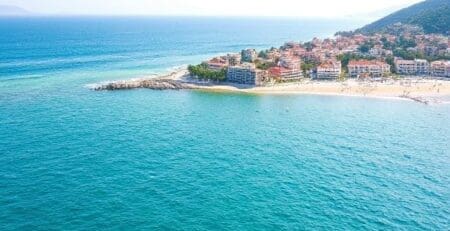Workforce integration and environmental, air, and waste management challenges in Albania
Albania’s transition from a centralized economy to a market economy over the past few decades has created deep wounds in the labor market. Failed economic privatization led to mass unemployment, especially in the industrial sectors. Rural-urban migration, with large-scale migration to urban areas, especially in Tirana, has led to informal settlements and a concentration of unskilled workers in low-paid jobs. Brain drain over the past three decades has lost a significant portion of the skilled workforce to emigration, leaving critical gaps in sectors such as education, engineering, and environmental sciences.
The current challenges related to workforce integration and connection to the environment are numerous, but below we will list the most important ones.
First, sectoral disparities. For example, agriculture employs 36% of the workforce but contributes only 19% of GDP, reflecting low productivity and limited modernization.
Manufacturing and industrial sectors are underdeveloped, reducing opportunities for well-paid jobs.
Second, education-system mismatch. Vocational and higher education systems are misaligned with labor market needs, especially in green and technological sectors.
Few programs focus on environmental science, waste management, or renewable energy.
Thirs, gender inequalities. Women face barriers to entering formal employment, particularly in technical and STEM fields crucial for green development.
Fourth, policy gaps. Weak enforcement of labor regulations in industries like waste management leads to exploitation and unsafe conditions for workers.
In the process of development policies, we have noticed that little importance is given to the allocation of labor, focusing more on its orientation towards numbers than quality and, above all, on the protection of the environment and the maintenance of the required parameters for air and environmental pollution.
In the last decade, environmental impacts have increased significantly, leading to pollution from the construction sector being positioned in second place among the largest air and environmental pollutants.
Given the government’s policy of placing tourism as an economic priority for sustainable development, this topic should become the main focus of civil society and citizens.
But does the policy on air quality in recent years seem to have a focus to influence?
To begin with, we all need to be updated on the main sources of pollution, which seem to be:
The volume of traffic in Tirana and other cities is a major contributor. Most vehicles are old models running on diesel imported from Europe.
Industrial emissions from the cement, mining and construction industries contribute significantly.
All this pollution has a direct effect on the health of each of us, which is reflected in:
Respiratory diseases related to particulate matter and nitrogen dioxide that are on the rise.
Vulnerable populations, such as children and the elderly, who face the greatest risks.
Beyond the unresolved problems of waste management created by residents, an additional problem and added cost has now been created by the management of waste created by foreign tourists.
Coastal areas face significant challenges with marine pollution, particularly plastic waste, threatening biodiversity and Albania’s burgeoning tourism sector.
Untreated wastewater from industrial zones pollutes rivers like the Ishëm and Shkumbin, while poor agricultural practices lead to soil erosion and declining fertility.
The management situation and weak focus seem to have tolerated the generation of a situation in major problems. We just have to look at the facts.
We have an inefficient infrastructure for waste management.
Albania generates around 1.15 million tons of waste annually, but recycling rates are below 15%.
Most waste ends up in landfills, many of which lack proper containment, leaching pollutants into soil and water.
Albania lacks facilities for proper treatment of hazardous waste and electronic waste, leading to illegal disposal and environmental contamination.
In this whole situation with many budgeting, cost, mismanagement problems and a development that creates problems for the environment, the question arises of how to integrate the workforce to help in the step-by-step treatment of the situation?
First, we think it is green skills development for the workforce engaged in this area of services. The municipalities need to organize specialized training and establish technical programs in renewable energy, air monitoring, and recycling technologies. University-Industry Collaboration should be in other level. To make happen should partner universities with businesses to align curricula with industry needs.
Second, incentivizing green jobs. To incentivise this step should be approved tax breaks for companies that invest in sustainable practices and create jobs in green industries.On the other side, should be developed micro-loan programs for startups in eco-tourism, organic farming, and clean technology.
Third, is necessary to work more to create programs to attract diaspora professionals back to Albania, offering competitive salaries and funding for projects in green innovation.
In a solution to air quality by engaging resources and workforce, it is necessary for the program of municipalities and the government to be oriented much more strongly towards the expansion of Public Transport.
If the modernization and expansion of the public transport network begins, focusing on renewable energy sources to reduce urban congestion and emissions, then this will create the conditions for the start of a much broader activity than to date, offering both opportunities for workforce diversification, but also to influence the reduction of air pollution that is already a major cause of diseases.
Subsidizing the purchase of electric and hybrid vehicles and temporary fiscal policies go hand in hand with this major project.
A growing need is to strengthen the implementation of the legal framework for emission standards for industries and vehicles, with fines for non-compliance, but mostly by also serving with continuous awareness campaigns. This situation requires this movement now and not tomorrow.
As in many specific areas related to invisible parts of public services, it seems that investment in air quality monitoring has been neglected.
What applies to environmental management policy is necessarily based on investment in air quality monitoring systems to inform policymaking.
Given the lack of appropriate investment, we understand that local policies in this direction have been neglected and that promise related to the lives and health of taxpayers has not been fulfilled.
Regarding waste management solutions, which seem to have been left in limbo after the corrupt implementation of policies for the use of incinerators for waste management in the country.
Even for this point, which needs manpower not only at certain moments, but throughout the entire waste management process, it is necessary to have strong leadership, which maintains a consistent will in this direction.
The idea of establishing mandatory waste separation at the family and business level, as well as according to the type of waste, was put forward a long time ago. Financial and human resources were also committed for this purpose, but the situation after some time degenerated into a return to the old ways with very little progress.
What we think is the commitment of resources in a comprehensive manner to encourage private investment in recycling plants and biodegradable packaging industries.
Although the waste-to-energy incineration projects have failed to show their positive side, it is necessary that the investments made are activated and that a new leadership shows that it knows how to build where its predecessors destroyed or made mistakes.
The development of waste-to-energy facilities, ensuring that they meet EU environmental standards, is certainly one of the directions, even though we are at the worst time to talk about this.
But, if we look at it from the economic benefit perspective, this commitment needs to be made with new will to exploit Albania’s potential for generating renewable energy from organic waste.
An approach that can engage joint resources from coastal municipalities, civil society and business should be addressed to marine protection initiatives. Very soon, if we continue to behave indifferently and exploitatively of natural resources, they will turn into a financial and natural boomerang for a significant part of us.
The launch of public-private partnerships to clean up Albania’s coastline should now be seen as another direction where free resources can be activated and integrated towards a long-term goal.
All this policy should be accompanied by the establishment and strengthening of stricter rules for the use of plastics and the promotion of biodegradable alternatives.
Cooperation with neighboring countries on cross-border environmental issues, such as shared river basins and the Adriatic Sea, should be further strengthened, as the initiatives so far are still at basic levels and have not given the desired effect.
In the management of coastal water areas, equally important is the water treatment infrastructure within the country. In the last two decades, internal water resources and all waters in the country have been misused, creating new problems in land and environmental management, and have contributed to the continuation of the culture of destruction and pollution, without paying anything in return, to influence the rehabilitation of damaged structures.
Although initiatives from municipalities are numerous, what we find is that massive projects for the construction of modern wastewater treatment facilities in the main urban, coastal, rural and industrial areas are missing.
The implementation of penalties for illegal discharges into water bodies is one of the weakest reactions of municipalities.
But, water and land management, wastewater management, as well as their protection from the co-occurring effects of nature, when it finds this environment influenced by politics and short-term profits, seem to be already going backwards, forcing residents and citizens to leave and avoid what abusive politics and individuals have created with criminal actions against the environment and nature.
Visible effects of this situation are seen in the failure to achieve the objective of achieving an economic model of sustainable agriculture.
Contradictory policies led by electoral motives, as well as the avoidance of responsibilities by each political force that has led the country, have created this environment, which has also been tolerated by the weak reactive culture of the community.
In this regard, in addition to the policies that we have addressed with dedicated comments, regarding the need for workforce integration we suggest:
– Introducing subsidies for farmers who adopt organic farming methods and soil conservation practices.
– Strengthening policies for soil protection, the irrigation system, and the reorganization of the sector based on the unification through economic interest.
In the entire process of environmental management and looking at it from the perspective of workforce integration, it is necessary to accelerate the adoption of EU environmental directives on waste, air quality and emission standards.
The use of IPA (Instrument for Pre-Accession Assistance) funds to modernize infrastructure and build capacity has also been hampered in this case, as a result of the low culture of governance management and the way the state is governed.
At the end of all this, educating citizens about the importance of recycling, reducing emissions and protecting ecosystems, as well as the culture of protecting the environment should not be for political motives and political credits, but as an obligation to oneself and the future.




Leave a Reply
You must be logged in to post a comment.